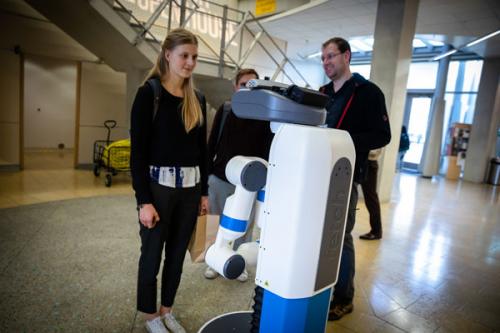
By Josh Baxt, CSE writer
.jpg)
Photo: Shanni Jin, Qualcomm Institute
On January 18, the Computer Science and Engineering (CSE) department hosted its first annual CSE Research Open House, during which faculty, students, and industry representatives celebrated the innovative work being conducted in CSE. The event included group presentations, posters, open labs, and numerous hands-on demos to highlight the many ways CSE faculty and students solve important real-world problems.
The day kicked off with keynote speaker Tom Ristenpart, who graduated from CSE in 2010. Now an associate professor at Cornell University, Ristenpart is working with NYC Family Justice Centers to help people being victimized by their partners. Sometimes abusers don’t need violence.
“Technology is being used quite often in these contexts,” said Ristenpart. “People send harassing text messages, use GPS devices to track people’s cars and many other things. We put together a group of interdisciplinary researchers to better understand the role of technology.”
The Family Justice Centers are one-stop shops for housing, mental health referrals, legal aid and other services, but the caseworkers lacked IT training. To get their arms around the problem, the team interviewed abuse victims. The stories were heartbreaking: from spyware on phones and computers to online impersonations, technology was being weaponized.
Ristenpart’s team looked at different ways to alleviate the abuse: identifying offending tech companies and getting their software tossed from app stores; working with legislators and the Federal Trade Commission; and giving case workers new tools to help victims.
.jpg)
Associate Professor at Cornell University.
Photo: Shanni Jin, Qualcomm Institute
But it’s an incredibly nuanced problem – if victims remove spyware, their abuser might escalate to violence. And many apps are dual use. Find My iPhone can both locate a device and stalk a partner. Ristenpart’s group has made a good start, but there’s a lot more to do.
This acute focus on problem solving was on display throughout the event. Doctoral students presented their work on programming languages and software engineering; visual computing; artificial intelligence (AI); systems and networking; cybersecurity and cryptography; and databases.
During the AI presentation, Mengting Wan, a PhD student who works with assistant professor Julian McAuley, presented her work, which examines data mining, machine learning and computational social sciences. She is particularly focused on understanding consumer behaviors, such as why people choose specific products.
Joseph Jaeger, who works with professor Mihir Bellare, later presented on cybersecurity – specifically, creating more secure links between text messages. He focuses on a mechanism called ratcheting, in which encryption keys change frequently. Even if a bad actor gains access to a text stream, they can be quickly shut down.
Detecting bluetooth-enabled credit card skimmers at gas stations was also front and center. This fairly rampant fraud uses technology to grab credit/debit card numbers, which thieves then download and misuse. CSE researchers visited more than 200 gas stations and developed an app that law enforcement and inspectors have started using to detect these devices.
Following the formal presentations, guests were invited to attend an extensive poster session and visit open labs throughout the building. Students showed posters and demos on healthcare robotics, using LIDAR-equipped drones to detect Mayan ruins, making software more user-friendly and many other topics.
Concurrent with the poster presentations and demos, the event’s six sponsors (AppFolio, Intuit, Lytx, Marvell Semiconductor, Teradata and Viasat) held Industry Information Sessions, offering valuable career information for students and other attendees.
Just before the morning’s keynote, CSE Department Chair Dean Tullsen and Jacobs School of Engineering Dean Albert Pisano gave a few remarks. Pisano highlighted the Jacobs School of Engineering’s superlatives. Jacobs is the number three school in the country for awarding baccalaureate degrees and number two for awarding them to women. Among public engineering programs, Jacobs is number one for research intensity – the actual resources focused on investigations.
.jpg)
Photo: Shanni Jin, Qualcomm Institute
Tullsen highlighted CSE’s growth. This year’s incoming class – more than 80 new PhD students – is by far the largest incoming PhD class in the department’s history. To keep up with this demand, CSE has hired 18 new faculty since 2014, including four in the past year.
In addition, Tullsen highlighted several faculty honors. Professor Alex Snoeren was named an Association for Computer Machinery (ACM) Fellow, while Christine Alvarado is now an ACM distinguished member. Professors Pavel Pevzner and Rajesh Gupta were named AAAS Fellows, and associate professor Hadi Esmaeilzadeh was honored with the IEEE TCCA Young Computer Architect Award.
The day ended with a reception and award ceremony, during which the poster competition winners were announced. There was a Research Prize, judged by faculty, for excellence in scientific innovation; and a Unicorn Prize, judged by industry reps, for the research most likely to be prized by industry. Leon Li won the Research Prize and Shravan Narayan was the runner-up. Soroush Ghodrati received the Unicorn Prize and Po-Ya Hsu was the runner up.
“What that all means to me is that I’m a lucky Dean,” said Pisano during his morning remarks. “I have great students, great faculty, great staff and with you here, I have great alums.”
.jpg)
Photo: Shanni Jin, Qualcomm Institute

